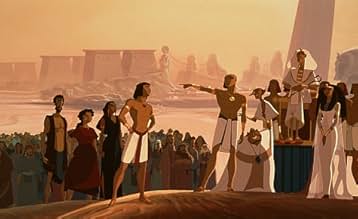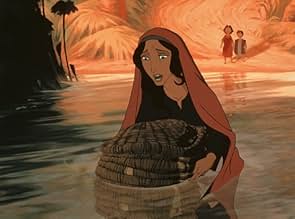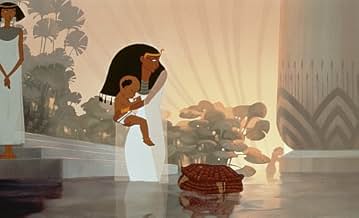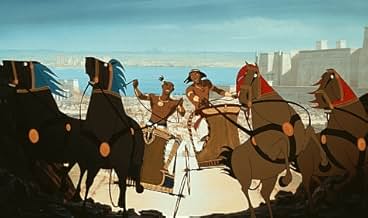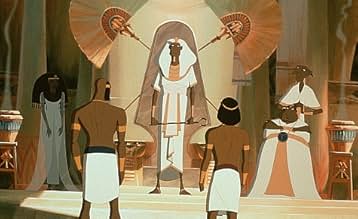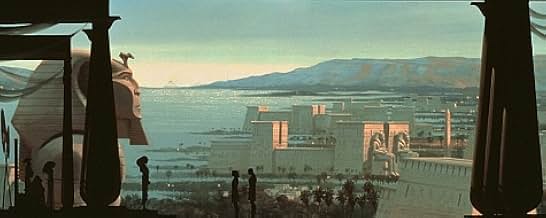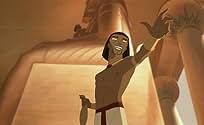Egyptian Prince Moses learns of his identity as a Hebrew and his destiny to become the chosen deliverer of his people.Egyptian Prince Moses learns of his identity as a Hebrew and his destiny to become the chosen deliverer of his people.Egyptian Prince Moses learns of his identity as a Hebrew and his destiny to become the chosen deliverer of his people.
- Directors
- Writers
- Stars
- Won 1 Oscar
- 12 wins & 27 nominations total
Val Kilmer
- Moses
- (voice)
- …
Ralph Fiennes
- Rameses
- (voice)
Michelle Pfeiffer
- Tzipporah
- (voice)
Sandra Bullock
- Miriam
- (voice)
Jeff Goldblum
- Aaron
- (voice)
Danny Glover
- Jethro
- (voice)
Patrick Stewart
- Seti
- (voice)
Helen Mirren
- The Queen
- (voice)
Steve Martin
- Hotep
- (voice)
Martin Short
- Huy
- (voice)
Bobby Motown
- Rameses Son
- (voice)
Eden Riegel
- Young Miriam
- (voice)
James Avery
- Additional Voices
- (voice)
Francesca Marie Smith
- Additional Voices
- (voice)
- (as Francesca Smith)
Shira Roth
- Hebrew Child
- (singing voice)
- Directors
- Writers
- All cast & crew
- Production, box office & more at IMDbPro
Featured reviews
The story of Moses is done here and, although not totally Biblically accurate, this is about as close as it gets in Hollywood. The inaccuracies are minor.
The artwork was fabulous when it came out in 1999. It's still very good, but animation has improved so fast in so short a time period that this is nothing special, art-wise, these day. However, it sure was when it was released just seven years ago. It's just beautiful in parts. Some of the prettiest colors I've seen on film have been in animated movies the last decade, and this is a prime example. The parting of the Red Sea in here is awesomely-done by the artists. That scene also sported the best sound in the 99-minute film.
The songs in here were nothing special but they didn't detract from the story because they were all short. Regarding the story, I only wish they had gone into detail on the plagues instead of just lumping them all together. They could have had some jaw-dropping scenes with the locusts, etc.
All-in-all a fine film and a rarity: a Biblical film that doesn't offend anyone.
The artwork was fabulous when it came out in 1999. It's still very good, but animation has improved so fast in so short a time period that this is nothing special, art-wise, these day. However, it sure was when it was released just seven years ago. It's just beautiful in parts. Some of the prettiest colors I've seen on film have been in animated movies the last decade, and this is a prime example. The parting of the Red Sea in here is awesomely-done by the artists. That scene also sported the best sound in the 99-minute film.
The songs in here were nothing special but they didn't detract from the story because they were all short. Regarding the story, I only wish they had gone into detail on the plagues instead of just lumping them all together. They could have had some jaw-dropping scenes with the locusts, etc.
All-in-all a fine film and a rarity: a Biblical film that doesn't offend anyone.
Quite possibly the most astonishing achievement in animation since Beauty and the Beast (and surpassing same), The Prince of Egypt is a lovingly crafted, engaging piece of cinema. The main characters are well-realized, three-dimensional characters. The focus of the film is the conflict between Ramses and his adopted brother, Moses, set against the backdrop of the epic events in the book of Exodus. The result is a religious tale that treats the oft-ignored human element. Instead of merely relating the tale as it is, the story asks "how would a person *feel* if God appeared to them and told them to do this? How would others react?" The script is light-years beyond any past biblical epic. The animation style owes a small debt to Disney's house style, but goes above and beyond in the details in character design (the Hebrews and Egyptians and Midians are clearly of different ethnic backgrounds, and no character suffers from the doe-eyed Disney Belle syndrome). Computer Generated Imagery blends -- for the first time in an animated film -- seamlessly with traditional cel animation. The film also takes some fairly audacious risks; Moses has a dream sequence in stiffly animated hieroglyphics, completely switching animation styles for about five minutes, which I believe is completely unprecedented in animation. There are moments when the visual effects made me forget to breathe. If you blink during the parting of the red sea, you'll regret it. There is, I believe I can safely say, not a second of the film that does not offer some sort of visual delight -- from the deep symbolism of the hieroglyphics to the dizzying chariot race in the opening sequence. The music has been touted by some critics as the film's weak link; such is definitely not the case. Stephen Schwartz' songs combine elements of Broadway-esque show tunes with native Hebrew and Egyptian music. The songs are powerful and moving, sometimes no more than one verse in length, sometimes full-blown seven-minute extravaganzas like "Let My People Go." The one weaker song, surprisingly, is the theme "When You Believe." Even freed from Mariah Carey/Whitney Houston R&B cheese as it is in the movie, it's a watery definition of faith at best. Still, the scene in which it takes place is powerful and the song is beautifully performed. If the film has a weak link, it might be the voice casting,Val Kilmer and Patrick Stewart in particular. The two voices are distinctive of the gentleman who possess them, and thus are distracting in this format. But such is a minor quibble, and should not dissuade anyone from seeing the greatest animated story ever told.
For sheer spectacle, it's tough to beat the Bible. With "The Prince of Egypt," DreamWorks makes good on its promise to deliver a state-of-the-art animated film that will compete favorably with the best Disney has to offer. As with "Antz," released earlier this year, DreamWorks has successfully resisted the temptation to populate this film with characters that can be turned into further revenue through toy sales. (I do wonder, though, if three soundtrack albums--the film's soundtrack, an "inspirational" album, and a "country" album--were really necessary.) The animation team has accomplished something truly spectacular; watching "The Prince of Egypt" is like seeing life breathed into a rich, luxurious tapestry. The Biblical story told in the books of Genesis and Exodus is followed very faithfully, with only minor changes made for dramatic reasons. The action sequences are truly exciting, overall pacing is excellent, and the miracles wrought by God are depicted with awed and respectful wonder. One truly astonishing, harrowing sequence recounts the slaughter of firstborn Hebrew children by bringing hieroglyphic drawings to life on the walls of an Egyptian temple. The voice work is especially good--Val Kilmer is fine as Moses, and Pharoah, voiced by Ralph Fiennes, positively seethes with arrogance and hubris. The storytellers wisely chose to end their tale at the climactic crossing of the Red Sea; even the delivery of the Ten Commandments is portrayed only in an epilogue vignette. (After all, the Israelites wander in the wilderness for forty years after that, and Moses ultimately is not allowed to enter the Promised Land--perhaps not the uplifting ending the filmmakers had in mind.) Some of the subject matter is dark and disturbing, and there is no shying away from the harsh realities of the original texts. By all means, see it with the children in your life--and be prepared to discuss it with them afterward.
This film did a pretty good job of sticking to the Bible,this is a wonderful family film.
The Prince Of Egypt is an extremely powerful movie. Amazing visual, score, story, music, characters, and everything else. You need to watch this movie. You will not regret it.
Did you know
- TriviaThe production team and executive producer Jeffrey Katzenberg conferred with roughly 600 religious experts to make this movie as accurate and faithful to the original story as possible. After previewing the developing movie, all of the religious scholars, experts, and leaders associated in the making of this movie noted that the studio executives listened and responded to their ideas, and praised the studio for reaching out for comment from outside sources.
- GoofsWhen the plagues destroy Egypt, not a lot of monuments are shown being toppled. However, in the song "When You Believe", when the Hebrews are walking through the ruins of Egypt, there is far more damage and destruction of Egypt that what was seen in the Plagues. However, the entire breadth of the plagues could not be shown since, in the record of them, the plagues last a lot longer than a few minutes, leaving the possibility that we didn't get to see all of the destruction.
- Quotes
Moses: Yes, Aaron, it's true. Pharaoh has the power. He can take away your food, your home, your freedom. He can take away your sons and daughters. With one word, Pharaoh can take away your very lives. But there is one thing he cannot take away from you: your faith. Believe, for we will see God's wonders.
- Crazy creditsAt the end of the closing credits, there are verses from religious texts - the Hebrew Bible, the New Testament and the Koran - in praise of Moses.
- Alternate versionsLater prints of the movie, such as the 2018 Blu-ray release and the Peacock print, add the 2013 Universal Pictures logo.
- ConnectionsFeatured in Troldspejlet: Episode #19.13 (1998)
- SoundtracksDeliver Us
Performed by Ofra Haza and Eden Riegel
Ofra Haza appears courtesy of BMG Ariola Munich
Produced by Hans Zimmer
Additional arrangements by Martin Erskine and Andrew Lippa
Music and Lyrics by Stephen Schwartz
Details
Box office
- Budget
- $70,000,000 (estimated)
- Gross US & Canada
- $101,413,188
- Opening weekend US & Canada
- $14,524,321
- Dec 20, 1998
- Gross worldwide
- $218,613,188
- Runtime
- 1h 39m(99 min)
- Color
- Sound mix
- Aspect ratio
- 1.85 : 1
Contribute to this page
Suggest an edit or add missing content


